By Christopher Miskimon
The morning of February 16, 1944, dawned foggy over the Via Anziate in Anzio, Italy. The 45th Infantry Division’s 2nd Battalion, 157th Infantry Regiment had advanced overnight to take positions on the west side of the roadway, assuming its place on the front line. Company E, commanded by Captain Felix Sparks, was assigned to one end of the battalion’s line, where it bordered the division’s 179th Regiment.
Looking out across the ground in front of his position, Sparks saw overcoat-clad figures moving but could not tell who they were. He called his headquarters and asked if the soldiers of the 179th had overcoats. When he was told they did not, Sparks realized the men were advancing Germans. It was not long before enemy artillery began to pound Company E’s foxholes. Shells landed for 10 minutes, but the troops were well dug in so casualties were light.
When the barrage lifted, three German tanks, unsupported by infantry, came forward and attacked. “They made a mistake,” Sparks said. Company E had an antitank gun and two M-10 tank destroyers supporting it. They opened fire at Sparks’s order and quickly destroyed two of the tanks, while the third made a fast retreat. Within a few minutes, however, German infantry attacked. Sparks’s men shot them down.
“We killed every damn one of them,” he later recalled. The sound of firing could be heard coming from the 179th’s lines; the enemy was attacking there as well.
Only a half hour passed before the third German wave came crashing at E Company. This time, the infantry came with armored support. “That’s what killed us,” Sparks said. The panzers moved up to point-blank range and opened fire. The fighting was intense; soon even more German troops were sent against Sparks’s men. As the company fought to hold back the enemy assault, Sparks saw a crewman from one of the tank destroyers climb atop the vehicle and man its .50-caliber machine gun, exposing himself to enemy fire. He stopped part of the German attack but was killed by a burst. Sparks did not even know the soldier’s name.
At midday, as the fight raged on, Sparks sent away his sole remaining tank destroyer, its ammunition depleted. It left at full speed with the Germans firing at it the entire way; Sparks watched rounds impact just behind it as it moved.
Shortly afterward, yet another wave of Germans attacked. This time, Sparks saw only one way to stop the assault. He called in artillery on his own position, a tactic used only as a last resort to avoid being overrun. Company E’s troops were still in their foxholes while the Germans advanced in the open. The attack was finally stopped.
As bad as this fight had been, it was just one engagement for Felix Sparks, one among many that would lead him and his men through Italy, France, and a final, hard-won victory in Germany. Three incidents would remain with him after the war. Two were of combat and one was of sheer horror. The fighting he and his men faced at Anzio was only the first.
Sparks Joins the 45th
Felix L. Sparks was born August 2, 1917, in San Antonio, Texas, and spent his childhood around Miami, Arizona, where his father worked for a mining company. The Depression struck while he was in high school, and soon after graduation from high school he left home to relieve his family of the burden of supporting him. His first idea was to find work aboard a ship, so he hitched rides on trains, first heading to Corpus Christi. Having no luck there, he made his way to San Francisco and tried again. However, getting a job required union membership, and Sparks could not afford to join.
Out of money, sleeping in a park, he wondered what to do when, as he trod down Market Street pondering his fate, an Army recruiting sergeant walked by and asked him, “Hey buddy, you want to join the Army?” At first Sparks continued down the street. Suddenly, realizing he had run out of options, Sparks turned and told the sergeant, “Yes, I do.”
Private Sparks selected the Coast Artillery and was given a choice of duty stations. He chose Hawaii and was sent to Fort Kamehameha, near Pearl Harbor. Since he could type, Sparks soon became the battery clerk and won promotion to corporal. The increased pay helped him save toward his goal of college and law school, but it was not enough. Noting that several soldiers were making extra money developing photographs at night in the latrines, Sparks convinced his battery commander to help him open a photography shop at the post exchange. Before long he was making more than his commander.
When his enlistment was up, Sparks took his discharge and enrolled in the University of Arizona. By the late 1930s, war clouds were looming, and he sensed the United States would be involved. He finished the remaining curriculum of a course called the Citizens Military Training Program, something he had started in high school, a contemporary version of today’s ROTC (Reserve Officers Training Corps), which gained Sparks a commission as a second lieutenant. He had just finished his first semester of law school when he was instructed to report for duty in 1940. The officer processing his orders assigned him to a Colorado infantry regiment, the 157th, forming as part of the 45th Division at Fort Sill, Oklahoma.
The “Thunderbird” Division Lands in Italy
The 45th, or “Thunderbird” Division, was a National Guard outfit formed primarily of units from Oklahoma, Colorado, Arizona, and New Mexico. After a few months of training at Fort Sill, the division moved to Camp Barkeley, Texas, and then took part in the famed Louisiana Maneuvers in August 1941. In spring 1942, they moved again to Fort Devens, Massachusetts, where its regimen included amphibious training. After a few more moves, the division set sail for North Africa in June 1943. There, Sparks and the 157th prepared for their first action, the invasion of Sicily.
Now a captain, Sparks took part in the landing as the adjutant to the regimental commander, Colonel Charles Ankhorn. The landings went well against relatively light Italian resistance, but a number of soldiers drowned in the rough seas. Over the following days, the bodies began to wash up on shore. This greatly distressed Ankhorn, who, tears in his eyes, told Sparks to get them buried. The only group available was the regimental band. The young captain set to the grim task, identifying the dead where possible and transporting them inland to a burial site.
After Sicily came the bloody fighting at Salerno on the Italian mainland. Sparks was now the commander of E Company. He described the campaign there as a “nightmare of rain, mud, cold and numerous casualties.”
On October 6, 1943, Sparks’s company was advancing toward high ground near the Ponte area as part of a larger effort to trap the Germans. A heavy fog concealed their movement. Shortly, however, the fog lifted, exposing the company to enemy machine gunners. Under heavy fire, Sparks and his men withdrew and attempted to flank to the left. They had stopped partway to rest and send out patrols when German tanks appeared to their left only 400 yards away.
The regimental history recounts, “The screams of the wounded and dying filled the air,” but Sparks remembers no screams but his own, ordering a retreat to a defensible ridge 1,500 yards to the rear. He described this action as “typical” of the Salerno fighting.
Breaking Out of Anzio
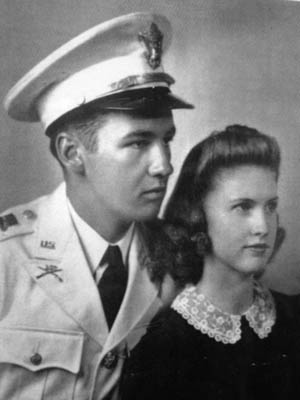
A few days later, an abdominal wound forced Sparks’s evacuation to an Algiers hospital. After recuperation, the Army declared him unfit for further combat and assigned him to training duties. Sparks hated this work, and it was not long before he decided to return to his unit. He went to a nearby airfield where he found a B-17 Flying Fortress bomber going to Italy. The captain then hitchhiked back to the 45th Division headquarters. They returned him to command of Company E. He rejoined the unit just before Christmas near Venafro. Though Sparks had been listed as AWOL (absent without leave) in Africa, the charge was later dropped, not an unusual disposition for men who went AWOL to rejoin their original outfits.
The next battle for Sparks would be Anzio. The initial battle continued for a week. After being repulsed by Company E, the Germans bypassed them, moving around both flanks. Sparks thought he could hold if he had tank support. He was promised a full platoon, but only two tanks arrived. Still, between the armor and the artillery support directed by Sparks for the rest of the day the company remained in position though the tanks eventually fell back.
The next morning Sparks withdrew the few dozen men still left to a position 300 yards to the rear. By this time the Germans had advanced well past Sparks’s tiny perimeter. Intent on their larger objective, they continued to bypass it. The captain used this relative respite to continually direct artillery fire. By February 22, the German attack had been broken, and the remains of Sparks’s battalion were ordered to break out overnight.
Come morning, the two survivors of Company E, Felix Sparks and a platoon sergeant named Leon Siehr, were back in the American lines. The company was rebuilt with replacements and a few returning wounded, but Sparks’s memories remain bitter. He led the unit during the breakout from Anzio and the advance toward Rome until it was withdrawn to prepare for its next task—Operation Dragoon, the invasion of southern France.
Defending Reipertswiller
Promoted to major, Sparks was now the executive officer of the 157th’s first battalion. The day before the invasion the commander contracted malaria, so Sparks assumed command. His unit was one of the assault battalions. Tension over the expected resistance was high. This time Sparks and his men got a break.
“Resistance was amazingly light,” Sparks recalled. ”We got about five miles inland the first day.” Afterward, the advance was rapid. “It was a chase until we got to the Vosges Mountains. Then the war slowed down.” Sparks was now a lieutenant colonel, in command of the regiment’s 3rd Battalion.
Resistance grew steadily as the Americans approached Germany itself. On December 16, 1944, Sparks’s battalion crossed into Germany. With the new year came a German offensive, launched as a counter to the failed Ardennes offensive to the north. The regiment occupied defensive positions around the town of Reipertswiller and dug in. The fighting here gave Sparks the second of his three worst recollections of the war.
On the morning of January 14, 1945, Sparks’s battalion was ordered to launch a counterattack. Just as the attack got under way, his jeep struck a mine, dazing the occupants though causing no serious injuries. The executive officer, Captain John McGinnis, took over as the battalion began to be shelled heavily. It was not long before McGinnis was wounded himself. Sparks was sitting in the battalion aid station when McGinnis was brought in.
Realizing he was needed forward, Sparks returned and assumed command. Despite the artillery fire, around noon the next day the battalion reached advantageous terrain with the rifle companies occupying an 800-yard front. Unfortunately, neither of the units to Sparks’s flanks had kept up with his men’s progress. The 3rd Battalion was now exposed. Higher command ordered him to hold.
The Germans quickly took advantage of the situation. Company K, on the battalion’s left, reported a strong enemy attack in the late afternoon. Sparks sent his reserve, the antitank platoon, to reinforce them. An hour later the attack was finally repulsed, and 50 German dead littered the ground in front of the American lines. The next morning SS mountain troops renewed the attack as other American units tried to close the gaps. Company C of the first battalion managed to close up on the right, but the SS troops again attacked on the left, infiltrating into the battalion’s rear and encircling the rifle companies.
The fight to relieve the trapped riflemen went on for four more days before the remains of 3rd Battalion were ordered to “attack to the rear” and break the encirclement. During this time, Colonel Sparks led a rescue attempt that resulted in his recommendation for the Medal of Honor. He took two tanks up a steep trail toward his cut-off men, hoping to open a narrow lane for their extraction. In the icy conditions one tank became immobilized, then had its turret jammed by enemy fire. Both tanks laid down fire with their cannon and machine guns, with Sparks firing the .50-caliber on top of the lead tank himself.
Ahead he saw three of his men lying wounded. As he later reported, “I jumped from the lead tank and successively dragged each soldier to the tank, loading them … on the tank deck. The Germans did not fire at me … although I was an easy target. We then backed the tanks back down the trail into our rear positions.”
The Battle of Reipertswiller resulted in the virtual destruction of Sparks’s battalion. Later, standing before General Robert Frederick, the division commander, Sparks told him, “If I had to do it over, I’d go against your orders and pull the battalion out while I could.”
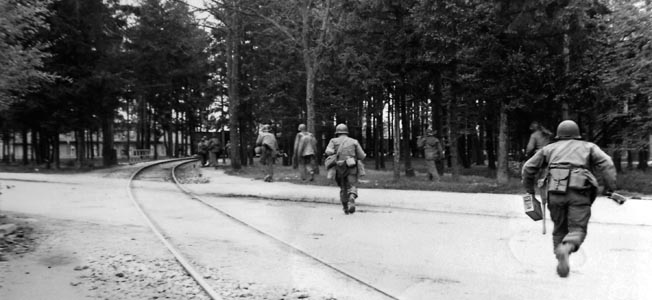
The exchange became heated; Sparks admits he was never popular with his superiors. Some of Sparks’s men believe this is why the Medal of Honor papers were later lost. He did, however, receive a Silver Star for his actions. Years later, a German soldier, Johann Voss, wrote of Sparks’s heroism in his own memoirs entitled Black Edelweiss. Though he had no idea who Sparks was, he recalled watching an American officer expose himself to rescue his wounded men in circumstances that match Sparks’s act in detail. He also said he and his fellow SS Mountain Troops could easily have shot Sparks down but held their fire out of respect for his courage.
Approaching Dachau
As winter gave way to spring, Sparks’s reconstituted battalion continued its advance into Germany. On March 15, his troops breached the Siegfried Line. They crossed the great Rhine River on March 26. At the end of March, the 45th Division fought one of its last major actions at Aschaffenburg. Sparks’s battalion led the way into the city, and it was Sparks who accepted the surrender of its military commander, a Major Emil Lamberth, after a week of fighting. Within a few weeks, the war seemed all but over.
Still, one last trial remained for Sparks and his men, the grimmest of his three memories of the war—the liberation of the Dachau concentration camp. As Sparks’s battalion, reinforced with tanks, artillery, and engineers, advanced toward Munich, the order came to divert and take the camp.
The Regimental S-3 radioed: “Upon capture, post air tight guard and allow no one to enter or leave.”
Sparks assigned his reserve, Company I, to lead the way and went with them. First Lieutenant William P. Walsh commanded I Company, bolstered by a machine gun section from Company M, the battalion’s heavy-weapons company.
The group crossed a railroad bridge and followed the tracks to the southwest corner of the Dachau complex. Sparks told Walsh to follow the tracks to the camp. As they approached the camp, their first discovery was a line of railroad cars filled with over 2,300 bodies, including women and children, victims of Nazi atrocity. The sight upset many of the men, and the mood became grim. Most of I Company entered the camp through a railroad gate at the southwest side, while Sparks took a small detachment a few hundred yards east and scaled the wall.
Chaos in the Camp
Sparks had decided to take this route because the camp’s main gate looked too easily defended. At the gate, however, was a group of Germans waiting to surrender. Before long, a party from the 42nd Division would enter through this gate and contact these Germans.
Suddenly, Sparks saw Lieutenant Walsh come from between two buildings chasing a German and screaming over and over, “You sons of bitches.” Sparks assumed command of the company from the hysterical man. It reportedly took seven men to move Walsh away and calm him. The camp guards were rounded up and herded into an empty coal storage yard. A machine-gun team and several riflemen were posted to watch them.
By this time, some of Sparks’s men were losing their composure, so he had to struggle to maintain order. A soldier approached Sparks and asked him to come away to show him something. As Sparks walked away from the coal storage area, the machine gunner watching the SS guards opened fire. Seventeen of the Germans were killed. Sparks ran back and stopped the gunner, a young private crying and out of control, who claimed the SS men had tried to escape. The young lieutenant colonel fired several shots in the air and ordered the shooting to stop. After putting an NCO on the machine gun, Sparks had the SS wounded moved to a nearby infirmary.
With discipline restored, he moved to the prisoner compound. He saw horrors such as a gas chamber, the crematorium, and the bodies of more dead inmates. The inmates, now aware of their rescue, were trying to get out. Sparks conveyed to them that they had to stay where they were because hospital units and food were en route. Men were posted at the gate to the prisoner compound.
Suddenly, several jeeps full of soldiers from the 42nd Division arrived. Among them was the assistant division commander, Brig. Gen. Henning Linden. With him were reporters, including a young woman named Marguerite Higgins. Dachau was not in the zone of action of the 42nd Division, but rather in that of the 45th Division. The reporters, eager to take part in the liberation of a concentration camp, had pressured the leadership of the 42nd to take them there. Linden was ordered to take a patrol to the camp along with the reporters.
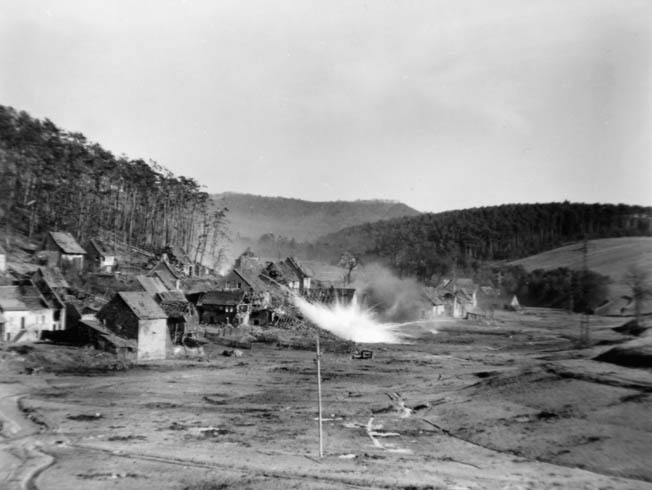
Now, before the gate to the prisoner compound, Linden told Sparks the reporters wanted to go inside and interview the inmates. Informing Linden of his orders, Sparks refused to allow it. While the two men were talking, Higgins ran over to the gate and opened it. The inmates surged out in a tide. Sparks had to order his men to fire over their heads to get them contained again.
After this episode, Sparks told Linden to leave. To enforce this, he directed some riflemen to escort them out. Accounts vary, but Sparks reported that as a private approached Linden’s jeep, the general hit the boy over the helmet with a riding crop or swagger stick. This infuriated Sparks, who drew his pistol and told the general that if he did that again Sparks would kill him. Linden left, promising a court-martial.
“A Bunch of Crap”
There was an investigation, and General Frederick tried to send Sparks back to the United States to let the incident blow over. He and a small party went to Le Havre, France, to await transport, but they were intercepted by military police with orders to arrest Sparks and send him back to Germany. Sparks and his still-armed escort “declined” to be arrested but agreed to return on their own.
Fate intervened.
During his absence, General George S. Patton had assumed command in the Dachau area, and the investigation was turned over to his command. Sparks was summoned into Patton’s office. The terse general characteristically referred to the investigation as “a bunch of crap” and threw away the papers in front of Sparks. Afterward, no one ever questioned Sparks about the matter, and no charges were ever recommended against him.
Shortly afterward, the war in Europe ended. Sparks went home, became a lawyer, and raised a family. He helped reorganize the Colorado National Guard in the late 1940s, became a district attorney, and served a term on the Colorado Supreme Court in the 1950s. After a brief return to active duty during the Cuban Missile Crisis, he was promoted to brigadier general and became the commander of the Colorado Army National Guard in 1968.
After retirement, Sparks helped run the 157th Infantry Association, even organizing reunion trips to the battlefields his regiment had fought and suffered over many years earlier. Felix Sparks passed away on September 25, 2007.
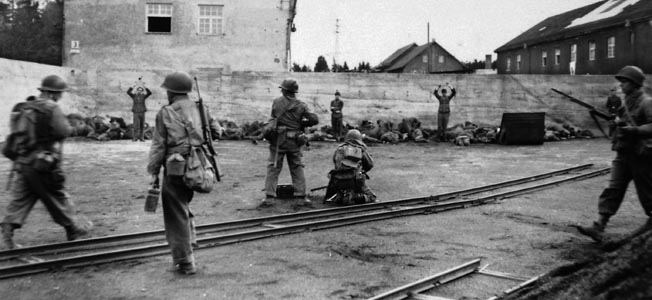
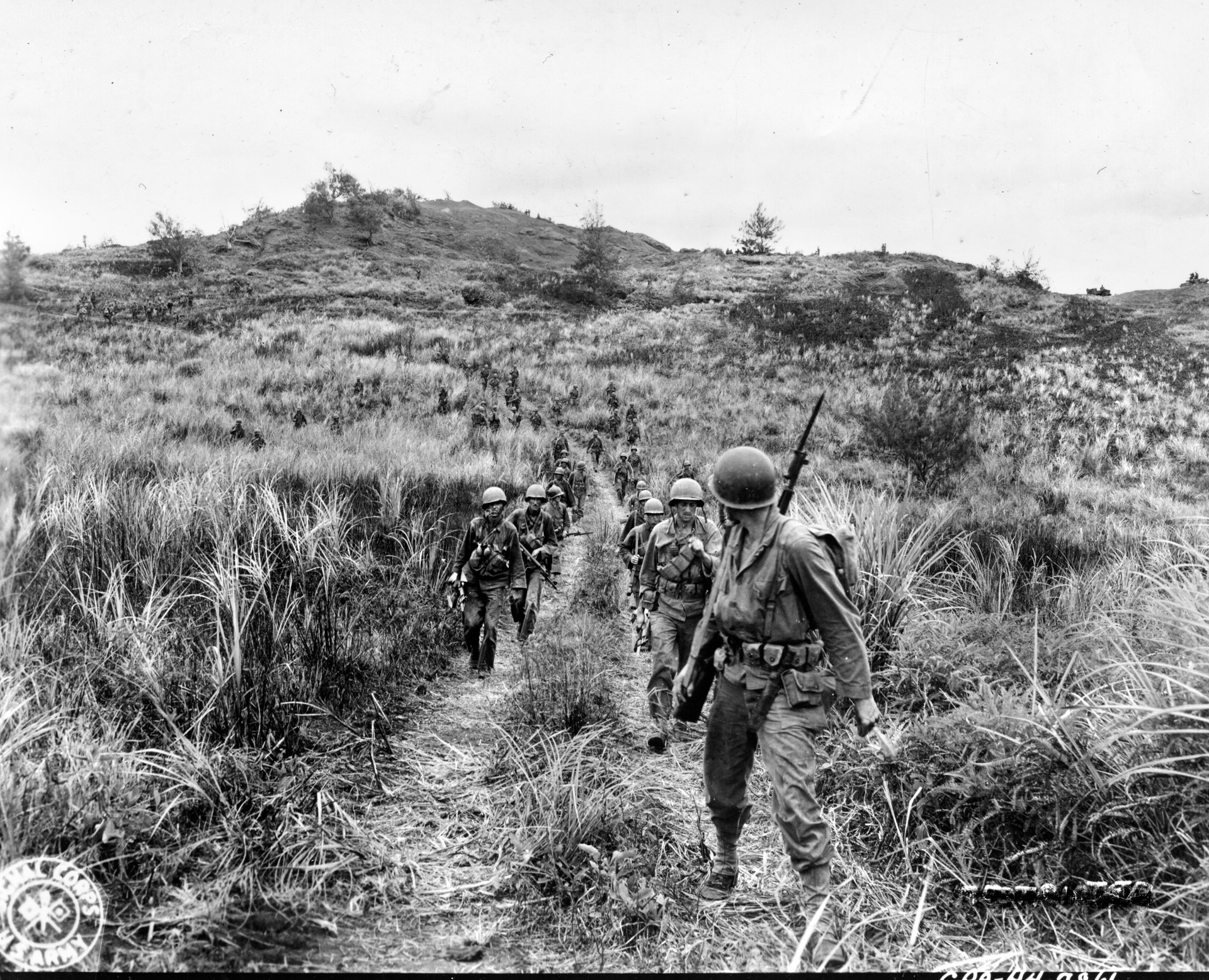
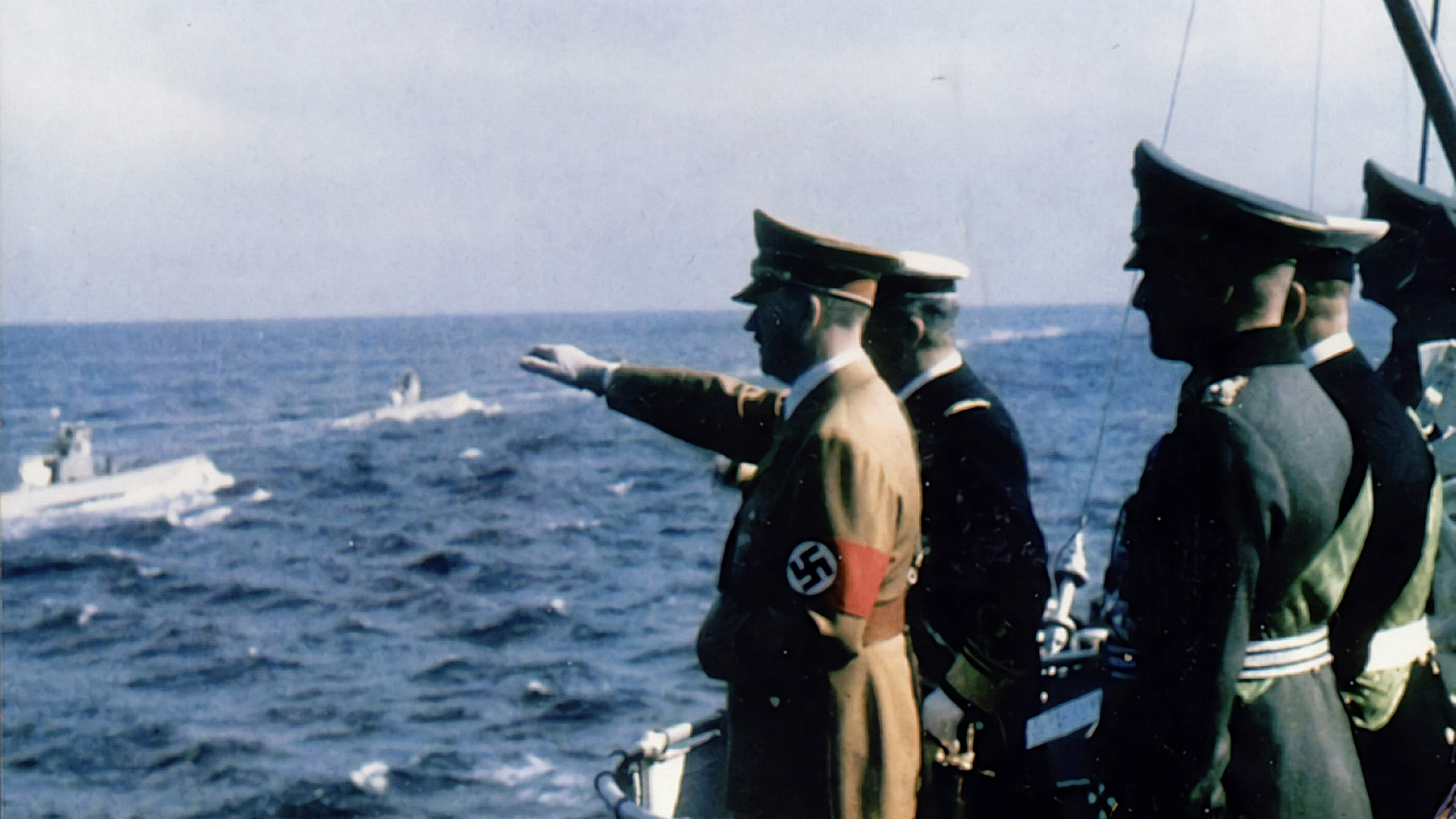
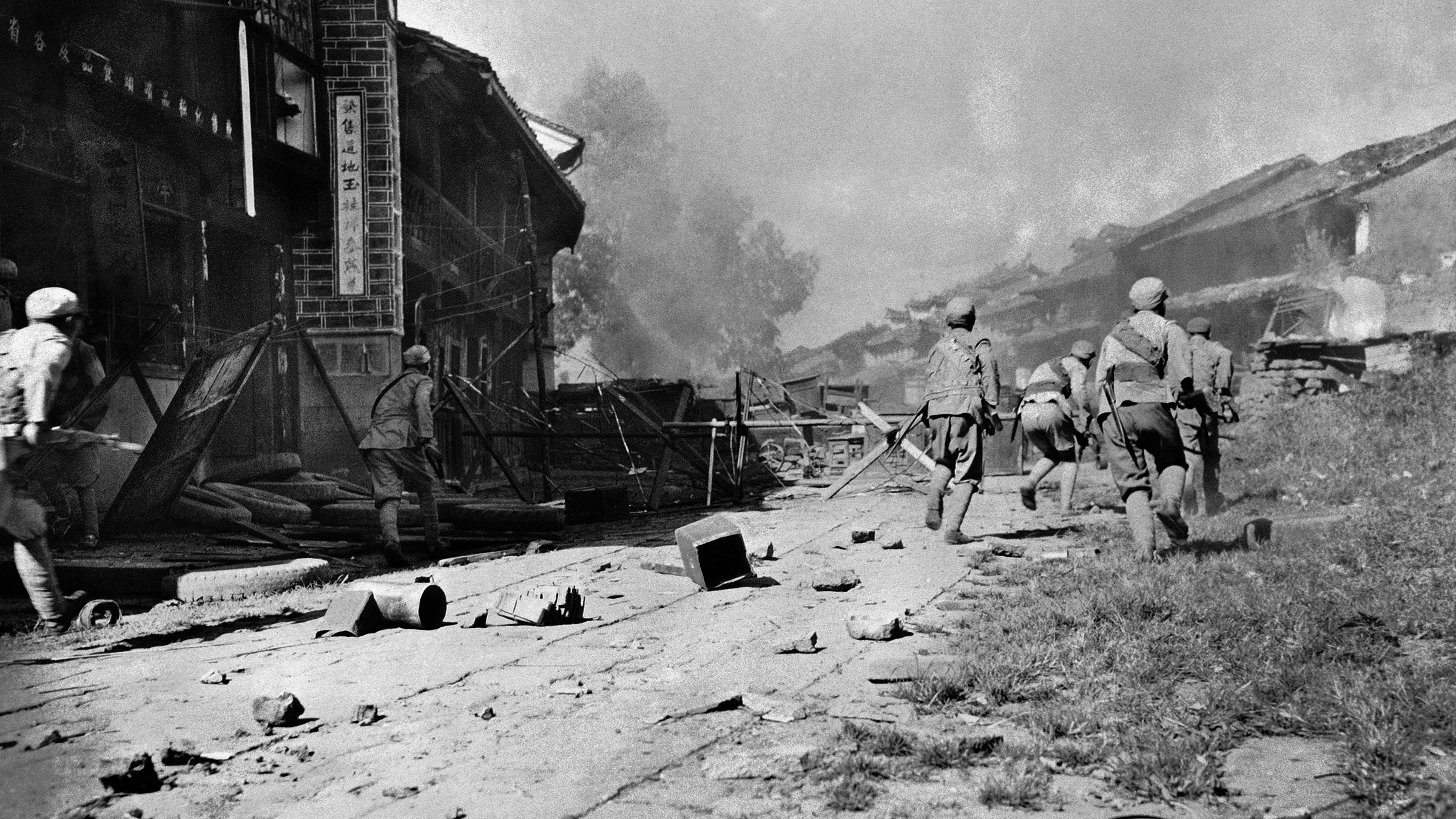
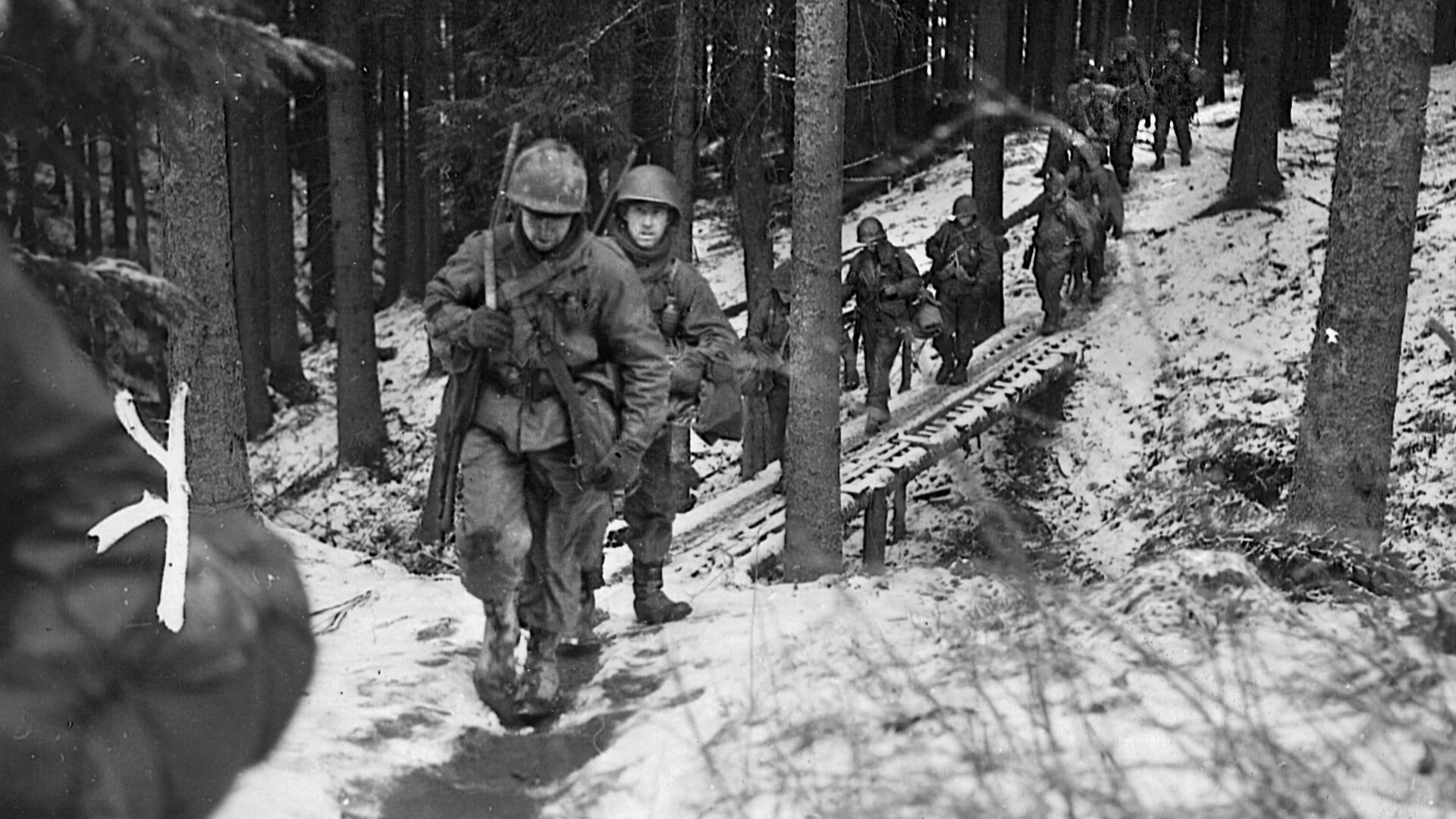
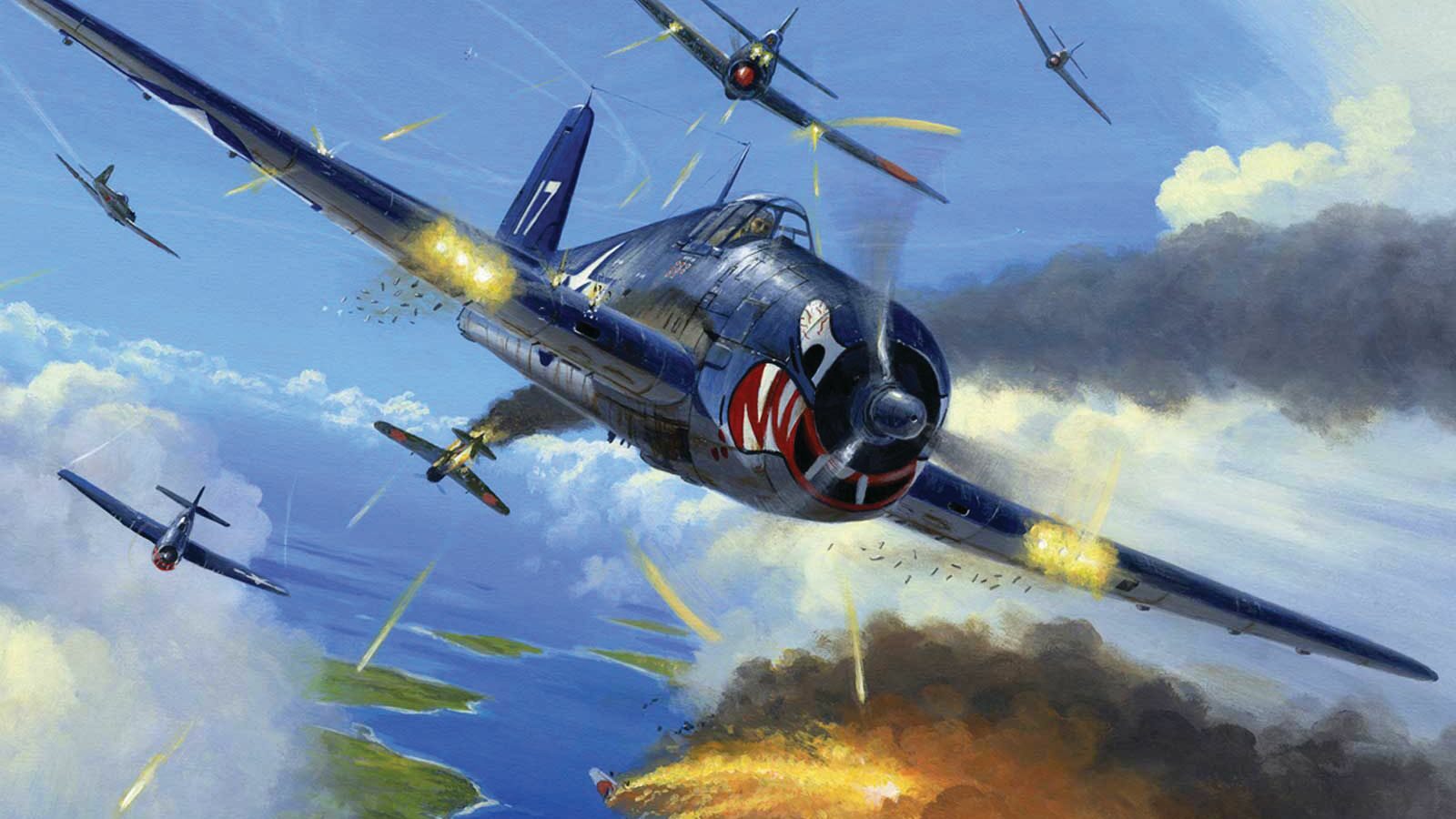
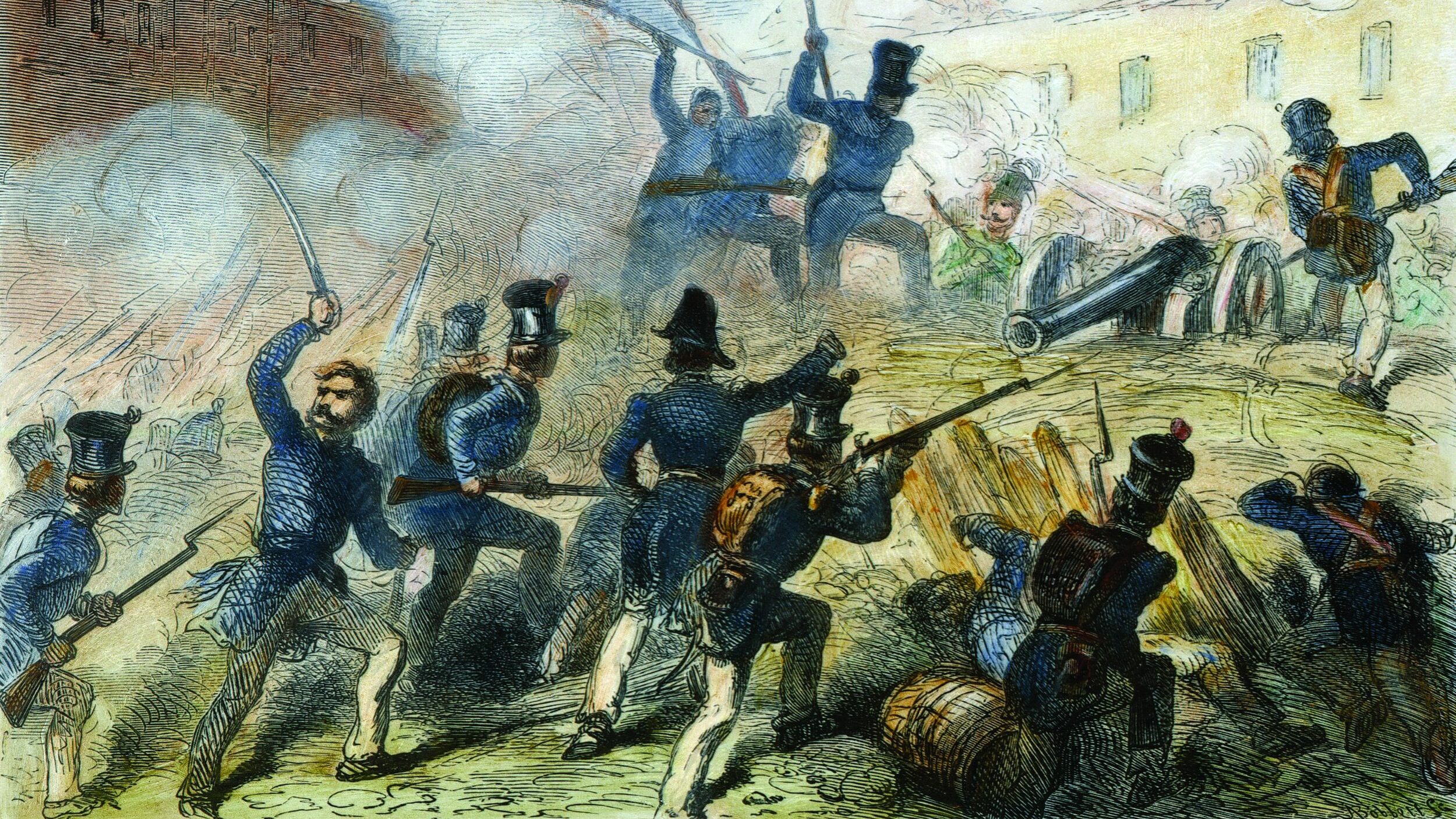
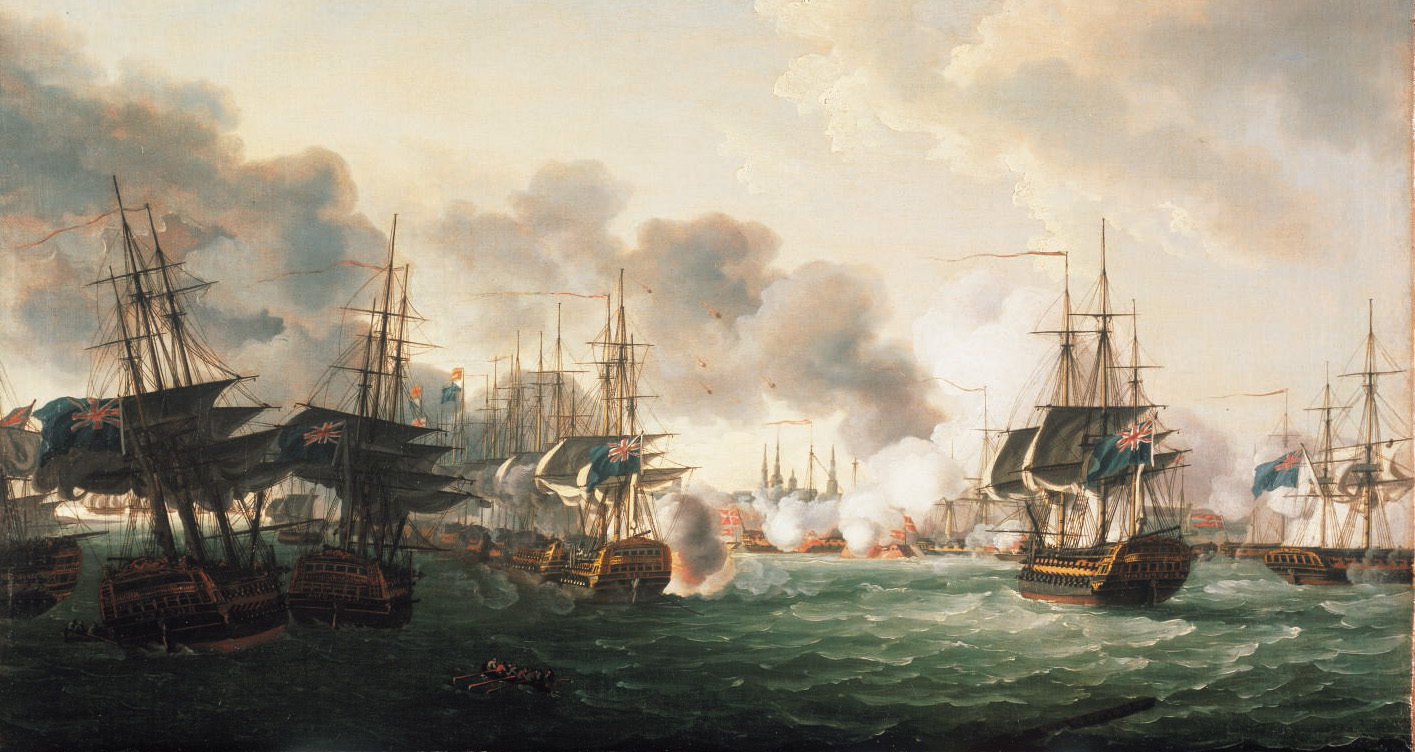
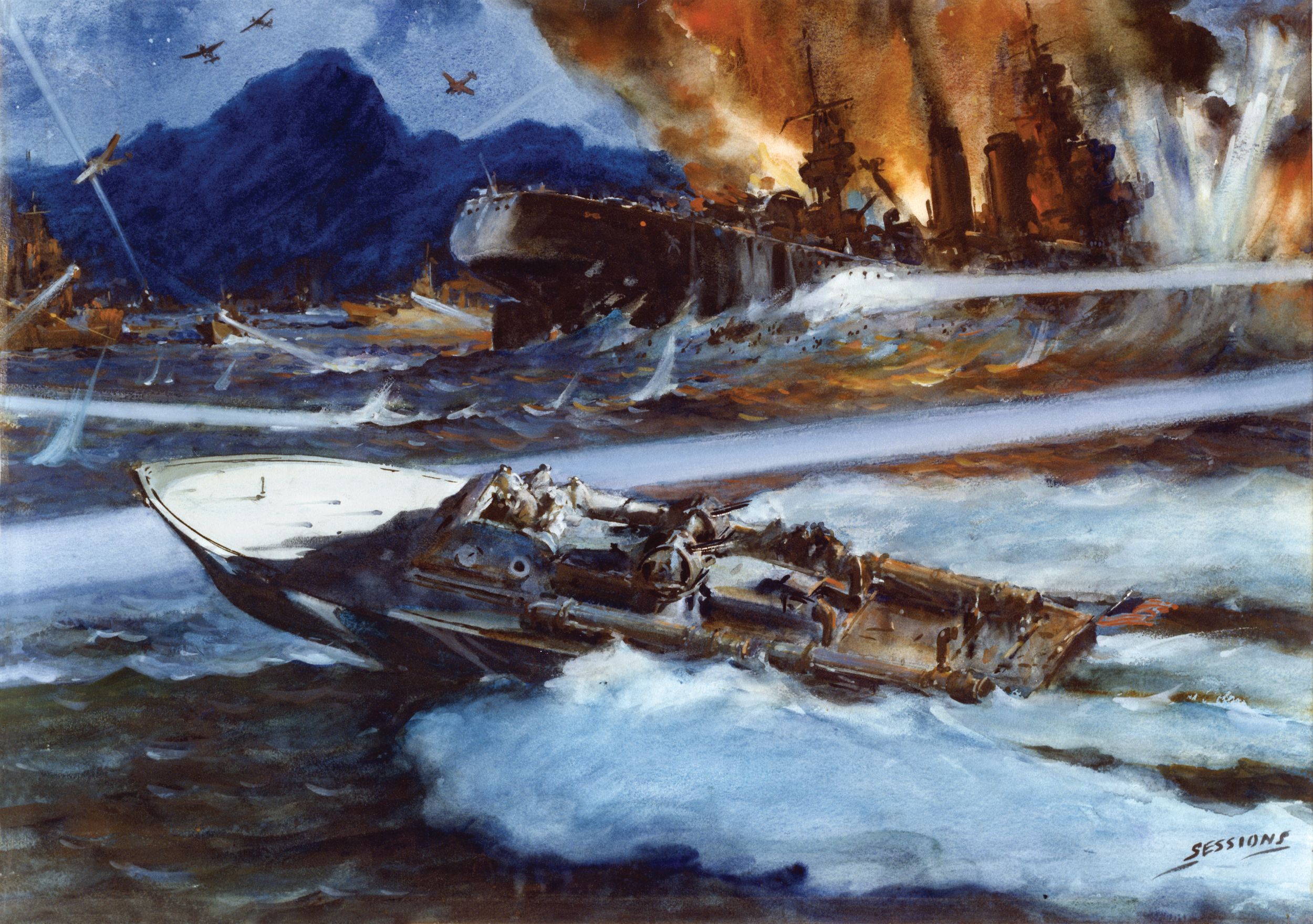
This was a good read. My brother was in the medics and was there
during the liberation. He remember that the rest of his life
Thanks Gordon
My father Col. Preston J.C.. Murphy, 179th CO, served with Lt. Col. Sparks as 1st battalion commander, 157th. Lt. Col. Sparks story is the story of every soldier that served in the 45th Division. Courageous, selfless, heroes everyone of them.
My late father-in-law Leroy Amos was a member of the 3rd Bn, 157th from December 1944 to September 1945. This article mirrors his recollection of the liberation of Dachau. On that day, Leroy — the radio-operator to the CO for I Company — was temporarily assigned as the radio-operator to LTC Sparks when Sparks’ regular radio-operator remained with the command jeep when Sparks went over the wall into the compound. He and Sparks remained friends until Sparks’ death. Leroy passed three years ago at the age of 98.